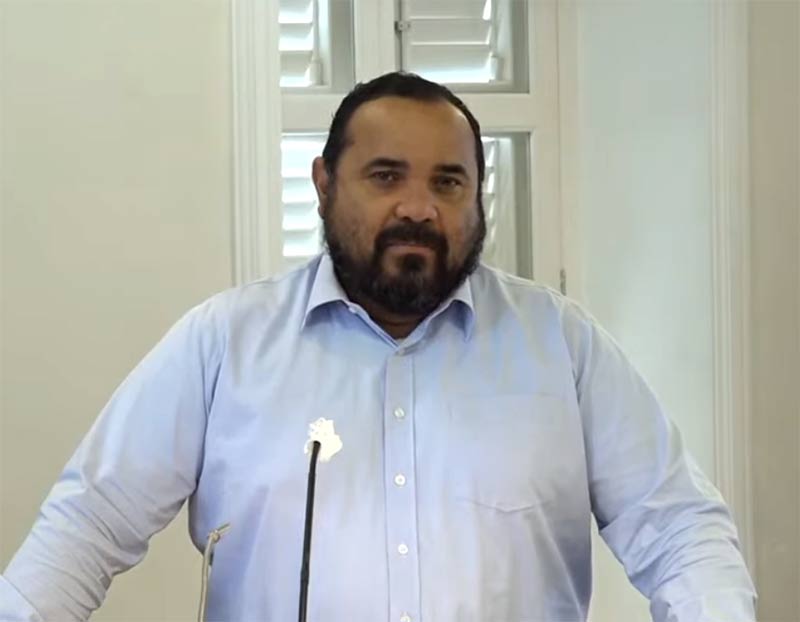Bonaire’s Phase 6 lockdown measures will continue for another two weeks, through April 16, 2021.
In a press conference yesterday, Bonaire’s Lt. Governor Edison Rijna asked the people of Bonaire to continue the Phase 6 lockdown measures for another two weeks to allow the current spread of the Coronavirus to slow. This is due to the current strain on health care services in Bonaire. Because of the spike in cases over the past weeks, some COVID-19 patients have needed to transfer to Aruba, Curacao, and Colombia for treatment.
Here is a transcript of his speech.
Transcript of Lt. Governor Edison Rijna’s speech.
Two weeks ago I made the decision to come up with very tough measures. This is to prevent the number of people with COVID-19 from continuing to rise. We have moved to risk level 6, the highest level. Given the current situation, I take the decision to remain at risk level 6 for another two weeks with all the extra measures involved. Let me explain why.
The number of people infected with the virus and the daily positive tests are still high. We still have a lot of people who test positive. It is true that the numbers are falling, but not enough to ease measures. The pressure on our healthcare and public health is still too great. This is why there are patients of ours who have to go abroad for treatment. We see that the situation is getting out of hand in Curaçao where sick people from Bonaire were admitted and that is no longer possible. At the moment there are five patients from Bonaire in the hospital in Colombia. Covid-19 must be taken seriously. It could cost you your life or the lives of people you love. That is why I have taken the decision to keep the measures that currently apply until April 16.
I am aware that this can be difficult for those who want to celebrate Easter with their family as we have been used to for years. I ask that you do not go to the beach or the sea in groups, go camping on the beach, or go to the kunuku. This is not possible because the chance that you will infect someone in your family or that you will become infected yourself is far too great. And what I just don’t want is for you to get COVID-19 too. Our hospital is already full of COVID-19 patients. Make sure you don’t become one of them.
Stay at home. Strict controls will take place at the weekend; especially at the sea, on our beaches and in the kunuku there will be controls. This is to prevent people from coming together in groups and thus posing a danger to themselves and to all of us. If you go to the sea, do it only with roommates. The same goes for the kunuku. It is not allowed to drink alcohol at the sea or other public places. If it is found that there are people who do not comply with these rules on the beach, they will be called to account and everyone will be sent away. This is to prevent the virus from spreading. The measures are there to protect us all.
All childcare is closed during the Easter holidays. After the days off in connection with Easter, childcare will reopen from April 12th. Students have a holiday until April 12th. After the holidays there will be school again. We are now using the time to vaccinate teachers and childcare workers so that they are protected after the holidays.
To protect Bonairean society even more, I take some measures for the people who come to our island. These measures will take effect tomorrow. They are especially for those from high-risk countries that are banned from flying, including countries from Latin America. Starting tomorrow, everyone coming from these countries must have a mandatory test after five days to see if they have COVID-19. Of course, the mandatory pre-flight test remains in effect. From April 8, all passengers from these countries arriving on Bonaire will be centrally quarantined at their own expense. After five days they have to get tested. If the result is negative, the person can leave quarantine. All this to prevent the different types of viruses that are spread worldwide, in particular the Brazilian variant that is currently spreading in Latin America, from spreading on Bonaire. Soon you will be able to read all the details about the quarantine rules and to which countries they apply at www.bonairecrisis.com.
Because the figures on Aruba and Curaçao are on the rise, we are also adjusting the obligation to test for passengers from Aruba, Curaçao and Sint Maarten. From April 8, passengers from these islands must take the mandatory test 72 hours before their flight, as well as a rapid test up to 24 hours before their flight. This can be replaced with a PCR test 24 hours before their flight if this is possible.
In the current circumstances, it is important that everyone adheres to the measures. Keep in mind that when you follow these measures, you are doing it to avoid getting sick or making someone you have interacted with from getting sick. I want to commend everyone who does follow the rules as well as the companies that can be open and make sure their customers are protected. A tribute goes also to the religious organizations that made it possible to virtually follow their services or masses. Thank you for your cooperation.
I can inform you that to date 5,465 people have already been vaccinated. From yesterday it is also possible for people to call a new toll-free number, 0800 0900, to get vaccinated.
I want to end with three requests to our community. The first: An urgent request to everyone to abide by the existing rules and measures. Second, if you have COVID symptoms, however mild they may be, get tested. Third, sign up to get vaccinated to protect yourself and your loved ones. Let us all take good care of ourselves and others.
Transcript of the speech by Dr. Marian Luinstra-Passchier.
We now have a major outbreak of Covid-19 on Bonaire, mainly caused by the British variant of the virus. The two previous outbreaks in September 2020 and January 2021 were small compared to what’s going on now. The outbreak started at the end of February, and from that time the contamination has been rolling over Bonaire. The virus is now found all over society. People are infected at work, at home, and in their circle of friends.
We see here on the left the small peak in September 2020, then the larger peak in January 2021. And at the end the large outbreak of March 2021. On the right side of the graph, we now see a slight downward turn. There are fewer positive tests this week.
This is mainly because people are less tested. We hope that even if more people get tested, this line will continue to decline. Only then do we know for sure that we are heading in the right direction. So, if you have complaints, be tested.
At the beginning of the outbreak, at the beginning of March, we saw that mainly younger adults were affected: people between 20 and 40 years old. As the outbreak progresses, we see the spread of the virus in families and at work. We also see that teenagers and a few children are infected, but especially more people between 40 and 60 years. The number of elderly people who are infected is smaller, but the consequences are many times greater for them. A few weeks after the start of an outbreak, we see that hospital admissions are on the rise. That happened here too. The number of hospital admissions is high and still rising. The hospital can handle a limited number of patients, and the hospitals in Aruba and Curaçao are full of their own patients. That is why patients are now being transferred to Colombia and receive the necessary care there. Sadly, seven people have died from Covid in the past month, and it’s not just elderly people. We sympathize with the relatives.
We now have two ways out of this worrisome situation. The first is: stick to the basic rules: keep your distance, stay at home, stay away from groups, wash your hands, get tested if you have complaints. View anyone you meet as someone who may be infected and keep your distance. That’s rule 1.
The second rule is: get vaccinated as soon as possible. It is very important that we vaccinate everyone, but especially our elderly, as soon as possible. If you have not yet registered as a 60+, please do so immediately. Vaccination does not completely protect you against infection, but if you were to become infected, you will not become seriously ill or will become much less seriously. If you are under 60: register for vaccination and bring your father and mother, grandfather and grandmother, uncle and aunt with you. Only by vaccinating as many people as possible can we get out of this worrisome situation. So join in, sign up: ban bakuná!
For additional information about Phase 6 Risk Level measures on Bonaire, visit the official crisis management website of the island government.
List of essential stores and vital functions and services.
I. Care, including informal care, purchase, and transport of medicines and medical tools;
II. Funeral homes and crematoriums;
III. Police, Coastguard, other services responsible for maintaining public order and Investigation and Police Doctor;
IV. Defense and Royal Netherlands Marechaussee;
V. Public Prosecution Service;
VI. Customs;
VII. Critical positions at Rijksdienst Caribisch Nederland;
VIII. Critical functions at the Public Entity of Bonaire;
IX. Legal system, including lawyers and civil-law notaries;
X. Teachers, insofar as they provide digital education and/or care for parents of vital take care of professions;
XI. Critical functions in the representation of third countries Bonaire (Consuls);
XII. Prison and other correctional institutions;
XIII. Private security and surveillance companies;
XIV. Airport, air traffic control, and air traffic safety;
XV. Meteorological service;
XVI. Ports, pilot services, port security inspection, and port state control;
XVII. Public transport;
XVIII. Food chain (broad) concerns supermarkets, mini markets, tokos, bread bakeries, wholesale and import, food transport, local production, processing and delivery, food banks, animal nutrition;
XIX. Production, storage, transport, and distribution of fuels (refined products);
XX. Production and distribution of water and electricity;
XXI. Production and supply of products for cleaning and disinfection, inclusive laundries;
XXII. Financial services, including insurance companies and credit institutions;
XXIII. Transportation of waste and refuse, including the landfill;
XXIV. Sale and transport of building materials;
XXV. Construction work, repair work, maintenance, and work on the infrastructure;
XXVI. Media and telecommunications;
XXVII. Internet and data services;
XXVIII. Postal services;
XXIX. Hotels
XXX. Continuity of emergency services:
a. Control room processes;
b. Firefighting;
c. Ambulance care;
d. Crisis management and disaster relief.
(Source: OLB)
















